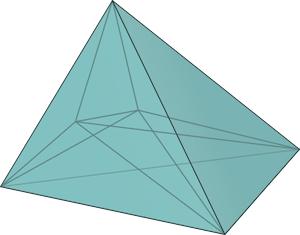Tropical Geometry and Positivity
Tropical positivity, determinantal varieties, and polytropes.
This site collects the projects concerning combinatorial and polyhedral aspects in tropical geometry, with a particular view towards positivity.
Tropical Positivity and Determinantal Varieties
A key concept in tropical geometry is the notion of tropicalization, which is often described as mapping an algebraic variety to a polyhedral complex that is referred to as its “combinatorial shadow”. The positive part of an algebraic variety is its intersection with the (real) positive orthant. A driving question in recent years is
Can we characterize the tropicalization of the positive part?
We introduce the notion of positive-tropical generators, a concept which may serve as a tool for studying positive parts in tropical geometry in a combinatorial fashion. These positive generators resemble the definition of tropical bases for general tropical varieties. More precisely, a finite set \(\mathcal P\) of polynomials forms such a set of positive-tropical generators of a variety \(\mathcal V \subseteq K^d\) if \[ \text{trop}(\mathcal V \cap (K^+)^d) = \bigcap_{f \in \mathcal P} \text{trop}(V(f)), \] where \(V(f)\) denotes the hypersurface defined by \(f\). Similarly, we can make the analogous defninition of signed-tropical generators for arbitrary signed tropicalizations, i.e. the intersection of \(\mathcal V\) with an arbitrary orthant.
A determinantal variety is the set of \((d\times n)\)-matrices of rank at most \(r\). As an algebraic variety it is cut out by the ideal generated by the \((r+1)\times(r+1)\)-minors. However, this does not transfer to its tropicalization, i.e. the minors do not form a tropical bases unless for very special cases depending on the values \(d,n\) and \(r\). We develop criteria for characterizing their positive part, with focus on the study of low-rank matrices (rank 2 and 3). We show that in rank 2 the minors form indeed a set of positive-tropical generators, which fully classifies the positive part. In rank 3 we develop the starship criterion, a geometric criterion which implies non-positivity. Moreover, in the case of square-matrices of corank 1, we fully classify the signed tropicalization of the determinantal variety, even beyond the positive part.
Slides of Talks
| 5 September 2022 | Geometry meets Combinatorics in Bielefeld | [Slides] |
| 11 August 2022 | Copenhagen-Jerusalem Combinatorics Seminar | [Slides] |
| 26 July 2022 | MOSAiC | [Slides] |
| 22 June 2022 | ECCO | [Slides] |
References
Multivariate Polynomials of Polytropes
Polytropes are those polytopes that are both tropically and classically convex. In the literature they are also established as alcoved polytopes of type A. In recent years they have enjoyed rising attention, with a particular focus on how to compute their (univariate) volume, and the unimodality of their (univariate) \(h^{\ast}\)-coefficients.
The connection to (tropical) positivity can be made via positroids polytopes, which are the matroid polytopes of matroids which lie in the totally positive Grassmannian. This class of polytopes is the set of matroid polytopes which are also polytropes.
We describe methods from toric geometry (more specifically toric intersection theory) for computing multivariate versions of volume, Ehrhart and \(h^{\ast}\)-polynomials of lattice polytropes. These algorithms are applied to all polytropes of dimensions 2, 3 and 4, yielding a large class of integer polynomials. We give a complete combinatorial description of the coefficients of volume polynomials of 3-dimensional polytropes in terms of regular central subdivisions of the fundamental polytope, which is the root polytope of type A. Finally, we provide a partial characterization of the analogous coefficients in dimension 4.
Slides of Talks
| 23 July 2020 | Discrete Geometry Seminar at FU Berlin | [Slides] |
References
- Multivariate volume, Ehrhart, and \(h^*\)-polynomials of polytropes Journal of Symbolic Computation, 114:209-230, January 2023. [abstract] [doi] [supplementary material] [bibtex]

